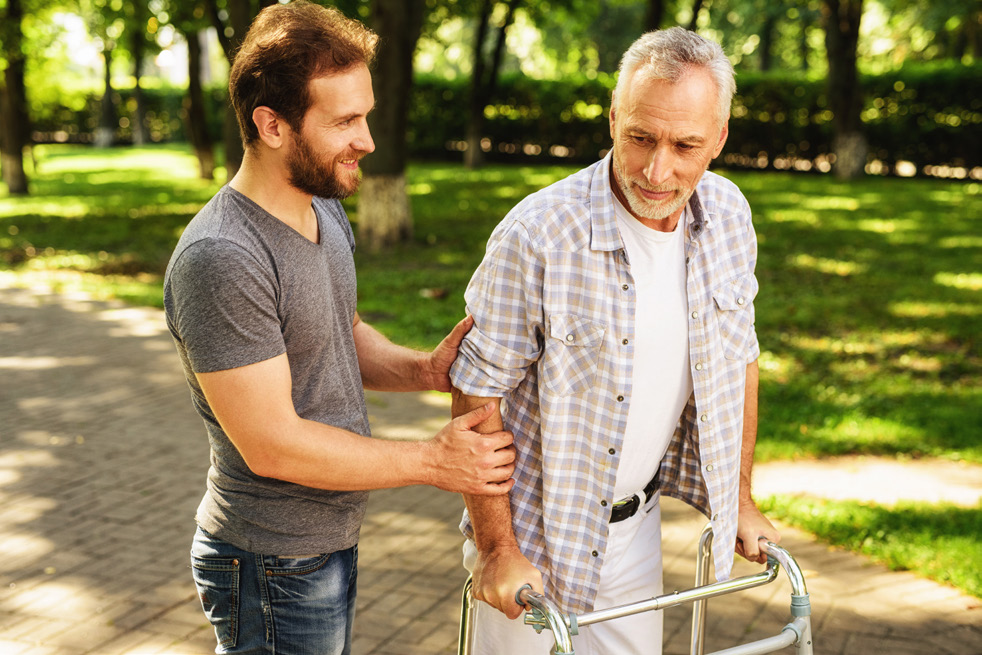Family Caregiving Tips: Where do I Start?
Helping take care of someone can be a stressful time, especially when you may not feel completely prepared to provide care. So, whether you are just starting to provide care to a loved one and trying to make plans, or are in the midst of caregiving, this fact sheet includes tips to help you provide the best quality of care possible to your loved one.
Start the Conversation
Begin by talking to your loved one about their wishes, what they feel they need from their family and friends and how they want other people to help. By having this conversation, a lot of uncertainty can be avoided – otherwise, you could make decisions based on assumptions that may or may not be right. Below are some steps to take when you decide to have a conversation.
- When you are ready to talk, look for an opening. Bring up an article you found or something you saw in the news.
- If you can, start small. Discussing the need for assistance can be extremely difficult for some people. So, it may be beneficial to discuss just one thing first. By starting small, your loved one may be more comfortable with the conversation and willing to discuss their wishes further.
- Respect your loved one’s wishes. Everyone is entitled to their own opinions regarding the care they want to receive. No plan should be made without the knowledge, participation and consent of your loved one. This includes individuals with cognitive impairment like Alzheimer’s disease or other forms of dementia.
- Size up the situation. Learn your loved one’s priorities, what they value and what is important to them. What does quality of life mean to them? These priorities will help you determine next steps.
Figure 1. Becoming a family caregiver can be overwhelming, so start small.
The “Musts” and “Not-So-Musts”
When thinking about where to begin with caregiving or when a change needs to be made, it is vital to consider the musts and not-so-musts. Musts are top-priority tasks – things that need to be taken care of first. Not-so-musts are those tasks that need to get done but can wait. Ask yourself these questions:
- Is this task important?
- Does this task need to be completed now?
If you answer yes to both of those questions, then that task is a must. If you answered no to either question, then that task is a not-so-must.
Common types of musts may include, among other things:
- Health care
- Personal care
- Safety
- Shelter
- Food
Common types of not-so-musts may include, among other things:
- Non-essential laundry
- Home maintenance
- Yard work
Create Your Care Team
You should not care for someone alone! Family members, friends and even community organizations can provide some much-needed help — with both your musts and not-so-musts. See the fact sheet T-2143, Family Caregiving Tips: Creating a Care Team for more detailed information on how to develop a care team.
Make a Plan!
With your loved one and all members of their care team, make a caregiving plan. As you think about your musts and not-so-musts, the care team members can choose the task that each may have the knowledge, skills, time and willingness to do. The team can also begin to explore options available in the community to support the care team. The care plan does not need to address all the “what ifs,” since you cannot anticipate every scenario. The plan should include immediate needs and probable future needs. For example, if your loved one would like to move within the next year, one or more members of the care team can take on the task of researching possible locations. See AARP’s Prepare to Care booklet for more information: Prepare to Care Planning Guide.

Figure 2. Plan your immediate and future needs.
Documents You’ll Need
As a caregiver, there are some documents that you or other members of the care team will need. Legally, it is important that your family member, who would like to have or needs help, has the following:
- Durable power of attorney (DPOA) – DPOAs specify who can legally make decisions for their loved one in the event that he or she is no longer competent. The two types most often used include a Durable Power of Attorney for health care and a Durable Power of Attorney for financial and legal decisions. The DPOAs can nominate the same person for each responsibility or different people – it is completely up to the individual. Be sure that your loved one’s health care providers and financial institutions have copies of the DPOAs so there are no issues with confidentiality. Your loved one should talk to a local attorney to make sure their DPOAs will meet their needs and wishes. See the Oklahoma Bar Association’s Find a Lawyer directory to locate a licensed attorney near you.
- Living will or advance directive – A living will states in advance what kind of medical care an individual does or does not want to receive and under what circum-stance. A fill-in form can be obtained from the Oklahoma State Department of Health.
Other documents and important information that your loved one should have available include:
- Personal documents (e.g., a list of income sources, a list of expenses/bills, marriage certificate, social security card, driver’s license, passport, a list of important websites and the passwords for each, etc.)
- Health care documents (doctors, chronic conditions, medications)
- Estate planning documents (will, trust documents, assets held in joint tenancy, etc.)
- Mortgage/loan information
- Insurance – home, auto, health (Medicare and Medicare supplemental), life, long-term care
- Utility account information
- Financial accounts (checking, savings, CDs, investments, retirement accounts)
- Several years of income tax returns
Emergencies are unexpected and stressful. Some businesses and agencies require various personal documents before they will talk to anyone other than your loved one. To avoid future headaches or stress, offer to help your loved one organize personal documents together into folders located in one safe place. Organizing the documents into a notebook or portable file container can allow you to “grab and go” if there is an emergency, as well as allowing you to have access to all necessary documents in one place if you need to file for services. Here are some general guidelines:
- Organize the notebook or portable file container using a system that your loved one understands.
- Make copies of any important documents and keep the originals in a safe location such as a safe deposit box at their bank.
- Be sure to keep the notebook or portable file container in a safe, but accessible location in your loved one’s home (e.g., fireproof box).
- Your loved one should tell someone they trust where the notebook or portable file container is located for emergency purposes.
Take a Breath!
Becoming a family caregiver can be overwhelming. Caregivers either gradually take on caregiving responsibilities or are suddenly thrust into the role after a loved one has suffered a traumatic event, like a fall or hospitalization for a sudden illness (e.g., stroke, heart attack, etc.). In dealing with the traumatic experience, caregivers believe they must learn everything they need to know to provide care overnight. This just adds unnecessary stress on themselves. New parents or employees are not expected to know everything in one day, and neither are you. Family members often help each other with errands like grocery shopping, yard work and preparing meals whenever there is a need – so you may already have previous experience as a helper/caregiver. When you start to feel overwhelmed, just stop and take several deep breaths for a moment and take some time for yourself.
Remember to Care for YOU!
The most important thing to remember as you and the other members of the care team provide care is to be sure that each of you also take care of yourselves. Balancing work and other family obligations with caregiving can be stressful, but it is important that each of you schedule time to relax. Stress has been shown to negatively impact a caregiver’s health, well-being and the ability to provide care. The care team cannot provide the best care for your loved one if any of you are not feeling up to your best. Everyone engages in self-care in their own ways.
- Be sure you are getting enough sleep, eating healthy foods and getting regular exercise.
- Find ways to reduce your stress– take a walk, listen to music or get together with friends.
- Make sure to take time to have fun! This can include going to the movies, reading, taking a walk — anything that allows you to decompress.
Caregiving is stressful, but we can become more resilient when we are better prepared. Understanding your loved one’s wishes, being part of a care team, making a plan and having access to important documents that are organized and easy to locate is a great start to being prepared for whatever hap-pens along your caregiving journey.

Figure 3. Make sure to take time to have fun! This can include going to the movies, reading, taking a walk — anything that allows you to decompress.
References
The Conversation Project (2018, April 10). Most Americans “relieved” to talk about end-of-life care [Press release].
National Academies of Sciences, Engineering, and Medicine. (2016). Families caring for an aging America. Washington, D.C.:The National Academies Press. doi:10.17226/23606 Washington, K. T., Meadows, S. E., Elliot, S. G., Koopman, R.
J.(2011). Information needs of informal caregivers of older adults with chronic health conditions. Patient Education and Counseling,83,37-44. doi:10.1016/j.pec.2010.04.01
Kristopher M. Struckmeyer
Assistant State Specialist for Caregiving

